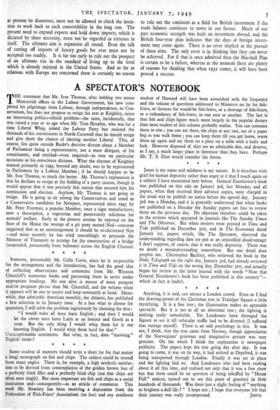Some student of manners should write a short (or for
that matter a long) monograph on fish and chips. The subject could be treated from many angles. There is, for example, a high aesthetic satisfac- tion to be derived from contemplation of the golden brown hue of a perfectly fried fillet and a perfectly fried chip (not that chips are often seen singly). But more important are fish and chips as a social institution and—consequently—as an article of commerce. This week Mr. Strachey has been receiving a deputation from the Federation of Fish-Friers' Associations (no less) and any assiduous student of Hansard will have been astonished with the frequency and the volume of questions addressed to Ministers on fat for fish- friers, or licences for would-be fish-friers, or a shortage of fish-friers, or a redundancy of fish-friers, in one area or another. The fact is that fish and chips figure much more largely in the popular dietary than most readers of this column probably realise. You can consume them in situ ; you can eat them, the chips at any rate, out of a paper bag as you walk home ; you can keep them till you get home, warm them up again and eat them on a plate on a table with a knife and fork. However disposed of they are an admirable diet, and deserve, as I say, a much larger place in literature than they have. Perhaps Mr. T. S. Eliot would consider the theme.






































 Previous page
Previous page